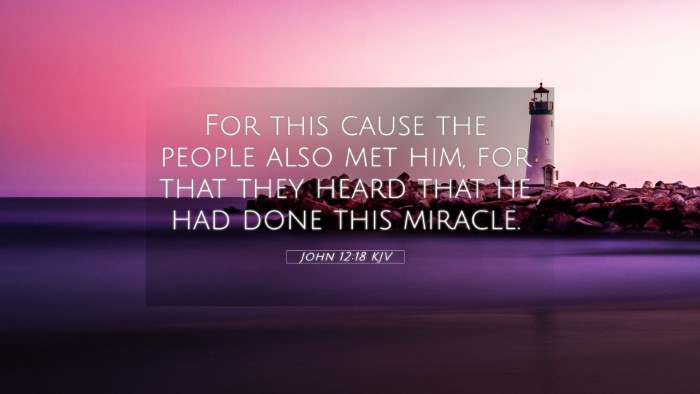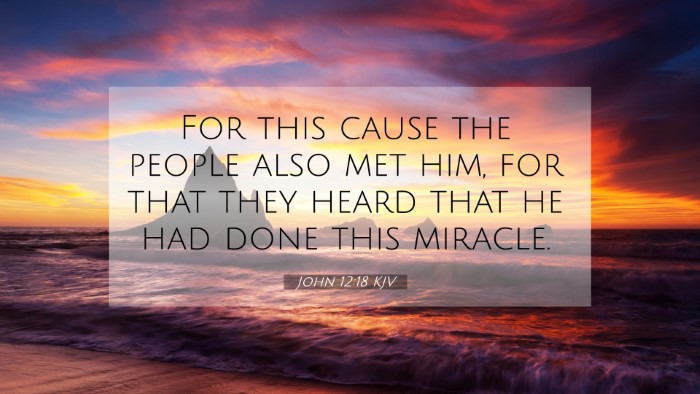Understanding John 12:18
John 12:18 states: "For this reason the crowd went out to meet him, because they heard he had performed this sign." This verse captures a significant moment in the life of Jesus as he enters Jerusalem, leading to the events of Passion Week. Below, we will explore the meaning and context of this verse by synthesizing insights from renowned public domain commentaries.
Verse Context
The verse is situated in the context of Jesus' triumphant entry into Jerusalem, often celebrated on Palm Sunday. This moment is a fulfillment of Old Testament prophecy and a pivotal point that sets the stage for Jesus' impending crucifixion.
Commentary Insights
-
Matthew Henry: Henry emphasizes the significance of the crowd's enthusiastic reception of Jesus, which reveals a mix of genuine recognition of his miraculous works and misguided expectations about political deliverance. The "sign" referred to is likely Jesus raising Lazarus from the dead (John 11), demonstrating his authority over death. The crowd's actions symbolize their hope for a Messiah who would liberate them from Roman oppression.
-
Albert Barnes: Barnes explains that the rush to meet Jesus indicates the excitement surrounding his miracles. The reference to the "sign" exemplifies how Jesus' miraculous works attracted followers, though many may not have understood the deeper spiritual implications. This verse invites readers to consider why they seek Jesus and the motivations behind their faith.
-
Adam Clarke: Clarke draws attention to the social and cultural implications of this event, noting the crowds' mixed motives. He suggests that while many came to honor Jesus, others might have been attracted to the spectacle of his miracles. Clarke also highlights the prophetic significance of this moment, as it fulfills Zechariah 9:9, which prophesied the king coming in humility to Jerusalem.
Thematic Connections
John 12:18 acts as a nexus for various themes in scripture, including:
- Messianic Prophecy: The entry into Jerusalem fulfills Isaiah 62:11 and Zechariah 9:9.
- Faith and Expectation: It highlights the differing expectations of the people regarding Jesus' mission (John 6:14-15).
- Miracle and Significance: Acknowledging the miracles performed by Jesus (John 11:43-44).
- Crowd Dynamics: The role of the populace in the narrative of Jesus, seen in various passages (Mark 11:8-10, Matthew 21:8-9).
- Contrast with Later Rejection: This initial acceptance contrasts sharply with the later rejection of Jesus (John 19:15).
Cross-References
Several Bible verses connect with the themes present in John 12:18:
- Isaiah 62:11: A prophecy about the coming Savior.
- Zechariah 9:9: The prophetic announcement of the king's entry into Zion.
- John 11:43-44: The specific miracle of Lazarus that drew the crowd.
- Mark 11:8-10: The description of the triumphal entry in another Gospel.
- Matthew 21:8-9: The people’s acclamation of Jesus as he enters Jerusalem.
- John 6:14-15: The people's reaction to Jesus' feeding of the 5,000.
- Luke 19:37-38: The jubilant shouts of the crowd as Jesus approaches.
- John 19:15: The transition from acceptance to rejection during the trial.
- Psalm 118:25-26: A traditional Psalm of praise anticipating the coming of the Lord.
- Matthew 27:22: The pivotal moment where the crowd chooses Barabbas over Jesus.
Conclusion: The Lesson from John 12:18
The excitement of the crowd in John 12:18 serves as a reminder of the human tendency to seek Jesus for the wrong reasons. Reflecting on the crowd's mixed motivations can provide insights into our own faith journeys and the importance of seeking a deeper understanding of Christ's mission. As we explore these connections, let us engage in deeper studies using tools like Bible concordances and cross-reference guides to enrich our understanding of scripture.



